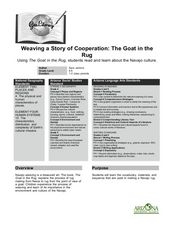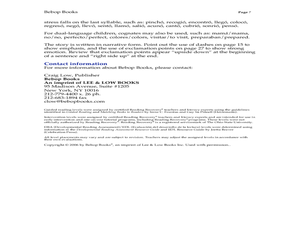Curated OER
It's A Mystery!: Drawing Conclusions
Using a unique approach, this resource provides clues and a logic problem for learners to solve in order to have them draw conclusions. This would be an interesting and fun way for students to practice reading, and critical thinking skills.
Curated OER
Amelia Earhart - Drawing Conclusions
Examine the life of Amelia Earhart with kids. They will read facts and view a timeline about Earhart's life. They will work in groups to read the last radio transmissions and draw conclusions about what happened in her disappearance and...
Curated OER
Read Between the Lines
Build comprehension, inference, and conclusion skills by encouraging learners to see the importance of reading between the lines.
Curated OER
Mr. Putter and Tabby Write the Book: Comprehension Skills
Your learners are just starting to read books on their own, so this resource is perfect! Cut out the bookmark-size slips of paper for learners to utilize while reading Mr. Putter and Tabby Write the Book. Each of the five bookmark pages...
Curated OER
Drawing Conclusions Lesson Plans
Teachers can use drawing conclusions lesson plans to help students learn how to connect their background knowledge to text.
School Specialty
The Tortoise and the Hare - Drawing Conclusions/Predictions Outcomes
Does the fastest one always win the race? Look deeper into The Tortoise and the Hare with a set of discussion questions for before, during, and after reading the story.
Curated OER
Drawing Conclusions from Historical Fiction
Students read historical fiction. In this drawing conclusions activity, students learn how to draw conclusions from text, specifically historical fiction. Students read Molly's Pilgrim and complete a graphic organizer where they answer...
Curated OER
Understanding a Story
Reading comprehension is the name of the game! After listening to the teacher model and share personal prior knowledge about small children and what they do with food, the class discusses how they too can use prior knowledge to...
Pennsylvania Department of Education
Drawing Conclusions Based on Literary Elements
Students compare versions of Cinderella and draw conclusions based on the story elements identified. In this literacy comprehension and story elements lesson, students read several versions of Cinderella, complete a "Comparing Folklore"...
Texas Education Agency (TEA)
Drawing Conclusions Based on the Sufficiency and Strength of Research (English III Reading)
High school juniors learn how to construct a strong argument by crafting a claim and using neutral language backed by evidence from reliable sources. To do so, they learn to evaluate sources and evidence to support claims. They then...
Curated OER
In Conclusion
Guide students on what reading comprehension and drawing conclusions really are. After discussing what they have learned and concluded from a short story, students read another story and work together to understand story details, and...
Curated OER
Recognizing Litter
When does trash become litter? Use this litter awareness lesson to help them understand the importance of trash disposal. Get learners engaged by reading Nancy Loewen's Lady Lulu Liked to Litter (not included). After discussing what...
Curated OER
"Monsters Are Due on Maple Street" by Rod Serling
These questions ask learners to think about the text "Monsters Are Due on Maple Street" in a variety of ways. In addition to practicing reading comprehension, class members work on interpreting, making inferences and connections,...
Houghton Mifflin Harcourt
Family and Friends: Extra Support Lessons (Theme 4)
Family and Friends is the theme of a unit offering extra support lessons. Follow each lesson plan's teach, blend, guided practice or practice/apply routine to reinforce concepts such as clusters, responding to reading, drawing...
Curated OER
Drawing Conclusions
In this drawing conclusions instructional activity, students read the sentences and select the best word to write complete the story. Students complete 6 examples.
Curated OER
Reading For Information
To help learners better comprehend informational texts, they work through a series of activities. They discuss strategies, make predictions, skim passages, focus on key words, and practice taking notes. This lesson focuses on what to do...
Roald Dahl
The Twits - The Monkeys Escape
Houses come in all shapes and sizes, but not all houses are safe from Mr. and Mrs. Twit. The 10th lesson in a unit designed to accompany The Twits by Roald Dahl turns learners into architects. While designing houses for the monkeys, they...
Curated OER
Weaving a Story of Cooperation: The Goat in the Rug
Weaving is an important part of Navajo culture. Read The Goat in the Rug to your fourth and fifth graders, and give them a glimpse into the process of rug making from the point of view of a goat! They will learn new vocabulary words and...
Curated OER
Drawing Conclusions and Comparing/Contrasting - The Everglades
Pupils complete activities to compare, contrast, and draw conclusions for a lesson about the Florida Everglades. In this drawing conclusions lesson, students watch videos about a scientists study of pig frogs that live in the Florida...
Curated OER
Mini-Lesson Planning for Inferences
Making inferences and drawing conclusions is a key component to successful active reading. Encourage your class to use context clues and prior knowledge to infer different elements of a story, including the setting, plot, and character...
Curated OER
Guided Reading with Elizabeti's Doll
Practice reading strategies using Elizabeti's Doll by Stephanie Stuve-Bodeen. Readers utilize decoding and comprehension strategies before, during, and after reading the story. A detailed list of text features, high frequency words,...
Curated OER
Lesson 1: Explicit Information versus drawing conclusions
Second graders look at the difference between explicit information and drawing conclusions. In this drawing conclusions lesson, 2nd graders read a passage and find areas where information is given and others where they have to think to...
Curated OER
Explicit Information versus Drawing Conclusions
Fourth graders read a comprehension passage and answer short answer questions and then identify their answers as explicit information or drawing conclusions. In this comprehension lesson plan, 4th graders do this as a whole and individuals.
Curated OER
Speed
Fifth and sixth graders practice working in pairs to determine whether they can walk with constant speed. They test themselves, collect their data, draw graphs with their data collected, manipulate the data, and then draw conclusions...
Other popular searches
- Drawing Conclusions Reading
- Draw Conclusions in Reading
- Drawing Conclusions in Reading
- Draw Conclusions Reading
- "Drawing Conclusions Reading

























